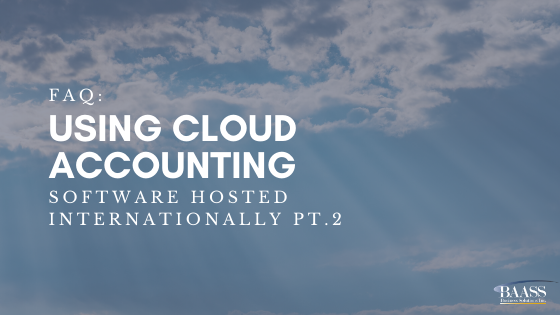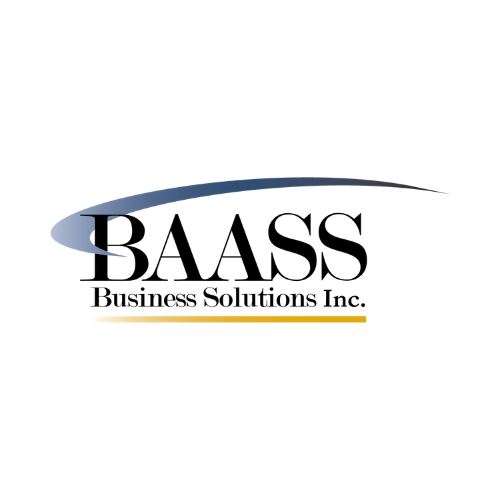
As Canadian organizations consider a move to Cloud Accounting, each must consider a number of items. Based on our experience assisting clients who consider the shift to the cloud, we created some Frequently Asked Questions and responses. This is the second blog in the series focusing on questions about your data in the cloud, the Canada Revenue Agency (CRA) and US government regulations. This first of the two blogs focused on your data, where it is stored and the Canadian Privacy Act (PIPEDA).
1. Does the CRA permit organizations to keep books and records in Electronic Format?
Books and records that are created and maintained in electronic format must be kept in an electronically readable format, even if the charity has paper printouts of the electronic records. An electronically readable format means information supported by a system capable of producing an accessible and useable copy that would allow auditors to process and analyze the electronic records on CRA equipment.
If any source documents are initially created, transmitted, or received electronically, they must be kept in an electronically readable format.
Scanned images of paper documents, records, or books of account that are maintained in electronic format are acceptable if proper imaging practices are followed and documented.
2. Does the CRA permit businesses to have accounting data hosted at a US data centre?
a. Yes, but special permission from the CRA may be required
b. For permission to keep records elsewhere, write to your tax services office. After reviewing your situation, the CRA will tell you in writing if you have been given this permission. The CRA’s written response will also specify any terms and conditions that apply to the permission.
c. If the CRA gives you permission to keep your records outside of Canada, you must make them available upon request in Canada for review by the CRA. Otherwise, CRA officials will travel to the country where your records are kept to review them, at your business’s expense.
The CRA may have given permission for your electronic records to be kept outside of Canada. If so, the CRA may accept copies if:
i. the CRA is satisfied that the copies of the records are true copies
ii. they are made available to CRA officials in Canada in an electronic format readable by CRA software
iii. they show enough details to support the returns filed with the CRA
If your records are kept on servers located outside Canada, you should access the servers or arrange for your staff to access the servers and provide the electronic system records required by CRA officials.
For more information on electronic record keeping, see Information Circular IC05-1, Electronic Record Keeping, andGST/HST Memorandum 15.2, Computerized Records.
3. Does the Canadian Revenue Agency (CRA) permit organizations to host accounting data in the cloud?
Yes
4. Does the CRA prevent any organization from having accounting data hosted at a US data centre? (Please note Question 1 and 2)
The CRA will not give permission to keep records outside of Canada to:
- registered charities
- registered Canadian amateur athletic associations
- municipal or public bodies performing a function of government
- housing corporations resident in Canada and exempt from tax under Part 1 of the Income Tax Act
5. If your accounting data is in a US Data Center Does storing a backup and a readable copy of your data in Canada (Excel format) satisfy the CRA requirements?
Yes if you have a current backup of your books and records physically located in Canada, the reports from which can be produced in an electronically readable way, e.g. Excel spreadsheets, you are meeting both the letter and the spirit of the CRA requirements. Unfortunately, We haven’t found a credible source that discusses this possibility. It might have to be explored with the CRA itself.
6. Are Records kept outside of Canada and accessed electronically from Canada considered to be records kept in Canada by the CRA? (Please note Question 5)
No
7. Can the US government make requests to obtain accounting data via the Patriot Act?
Yes but one of our principle Vendors, Intacct, has indicated that a request has never been made of them to obtain a customer’s data. We have received the same information from other accounting software and cloud software publishers as well.
8. Can the Canadian government make request to obtain accounting data via Anti-Terrorism Legislation?
Yes but we are unaware of any requests being made with any of our software vendors
9. Does the Canadian government have access to accounting and data in the cloud?
No but they have the same rights and legislation as the US government and other governments and some would argue more access to your data than the US government.
10. Does the Canadian or US government have access to on-premise accounting data?
No but they can take measures to obtain just as they would with data in the Cloud
11. Will an accounting software provider provide customer data to the US or Canadian government without your knowledge?
No the US government and for that matter no government has access to your data they must request it from the publisher and the publisher must inform the customer that the request has been made so that they have the right to appeal.
If you have more questions or would like to learn more about cloud accounting, please contact us. We are here to help. BAASS is hosting a free webinar series on the cloud accounting on cloud. Click here to register for our first webinar on April 12th at 1 PM ET: Debunking Myths About Cloud Accounting.
